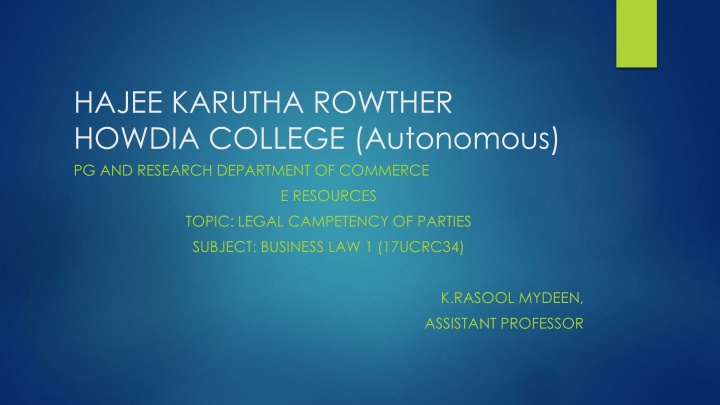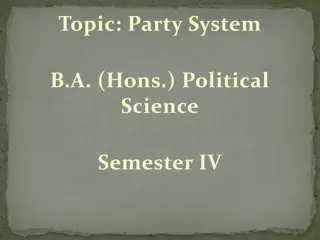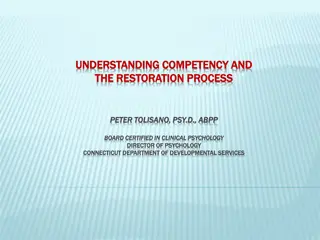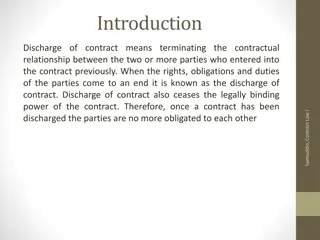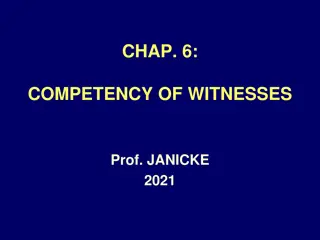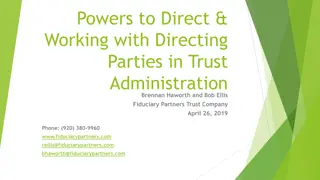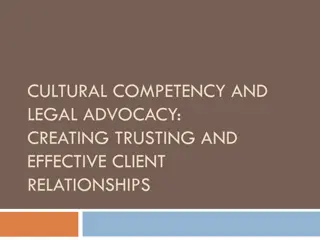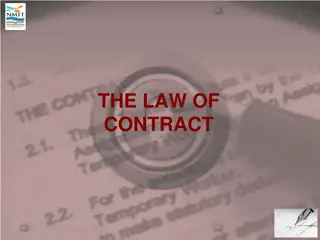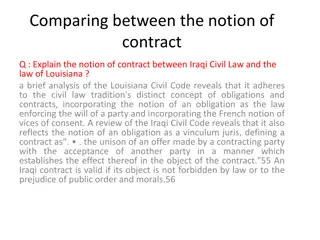Legal Competency of Parties in Business Law: Understanding Capacity to Contract
Capacity to contract is crucial in business law, ensuring parties are competent to enter valid agreements. Minors, persons of unsound mind, and those disqualified by law lack competency to contract. In India, minors under 18 years cannot enter valid contracts, and contracts by minors are void. However, a minor's estate is liable for necessaries provided. Minors cannot ratify contracts upon reaching majority and cannot be partners but can be agents. Contracts by misrepresenting a minor's age are void. Agreement on behalf of a minor by a parent or guardian can be valid if for the minor's benefit.
Download Presentation

Please find below an Image/Link to download the presentation.
The content on the website is provided AS IS for your information and personal use only. It may not be sold, licensed, or shared on other websites without obtaining consent from the author.If you encounter any issues during the download, it is possible that the publisher has removed the file from their server.
You are allowed to download the files provided on this website for personal or commercial use, subject to the condition that they are used lawfully. All files are the property of their respective owners.
The content on the website is provided AS IS for your information and personal use only. It may not be sold, licensed, or shared on other websites without obtaining consent from the author.
E N D
Presentation Transcript
HAJEE KARUTHA ROWTHER HOWDIA COLLEGE (Autonomous) PG AND RESEARCH DEPARTMENT OF COMMERCE E RESOURCES TOPIC: LEGAL CAMPETENCY OF PARTIES SUBJECT: BUSINESS LAW 1 (17UCRC34) K.RASOOL MYDEEN, ASSISTANT PROFESSOR
Capacity to Contract Capacity means competence of the parties to enter into valid agreement. According to Section 11, "every person is competent to contract, (i) who is of the age of majority according to the law to which he is subject, and (ii) who is of sound mind, and (iii) who is not disqualified from contracting by any law to which he is subject". Thus, it is clear from the above definition that the following persons are not competent to contract () Minors. (ii) Persons of Unsound Mind. (i) Persons disqualified by law to which they are subject.
I. Minors In India, minor is a person who has not completed the age of 18 years. However, a person continues to be a minor until he completes the age of 21 years, (a) if a guardian has been appointed to him or (b) if he .is under the guardianship of the court of wards. 1. MINOR'S CONTRACT VOID A contract by a minor is void in Indian Law. It was well established in MOHORI BIBI Vs. DHARMODAS GHOSH where a minor executed a mortgage and received Rs. 8,000/- from the mortgagee.
2. NO RATIFICATION A contract by a minor cannot be ratified on attaining majority It was established in the ARUMUGAM Vs. DURAL SINGA case where a minor executed a promissory note in satisfaction of note accepted by him during his minority, 3. MINOR 1S LIABLE FOR NECESSARIES A minor's estate is liable to pay for the necessaries supplied to him or to his dependants (section 68). The necessaries are determined on the basis of his position and financial status. The costs incurred in defending a suit or prosecution on behalf of a minor and the money advanced for his marriage expenses were also held as necessaries (Kidar Nath Vs. Ajudhia).
4.MINOR MAY BE AN AGENT BUT NOT A PARTNER A minor can be an agent but he cannot be a principal or a partner in a firm. However, he can be admitted to the benefits of partnership. 5. CONTRACT BY MISREPRESENTING MINOR'S AGE A contract entered into by a minor by fraudulently misrepresenting his age is void. However, the court may direct the minor to restore the property, if possible, to the other party on reasonable grounds. Thus, law protects them and does not give them the liberty to cheat men
6. AGREEMENT ON BEHALF OF A MINOR An agreement entered into by a parent or guardian on behalf of a minor is valid provided it is for his benefit. 7. MINOR MAY BE A PROMISEE OR BENEFICIARY A minor can be a promise or beneficiary. in other words , can take a benefit under a contract though he cannot be bound by it. Therefore, a sale or mortgage in favour of a minor is enforceable by him.
8.NO INSOLVENCY A minor cannot be adjudged as an insolvent. Infant (or) Minor in English Law A person who does not attain the age of 18 years is called an infant or minor in English Law. (i) A contract entered into by such person is void unless it is for necessaries and for his benefit.
ROBERTS Vs GRAY: A, minor promised to pay an amount to Roberts for learning billiards from him. It was held that the contract was for the beneft of minor and hence, his estate was liable. RYDER Vs WOMBWELL: A minor purchased golden articles for presentation and for his personal use. It was held that these articles were not necessaries and hence, his estate was not liable
(ii) However, contracts of continuing obligations like partnership or lease agreements entered into by a minor are voidable in English Law. Such contracts are enforceable only after he attains majority. A number of privileges are given to minors in English as well as in Indian Law. The reason is that they should not be misguided by others on account of their immaturity. The Law is safeguarding the minors and their properties and forgive their ignorance. However, the minors are not allowed by Law to defraud others by misusing the privileges.
II. Persons of Unsound Mind A person is said to be of Unsound Mind if he is not capable of, (a) understanding the contract and (b) forming a rational judgement as to its effect upon his Own interest, at the time of making the contract (Section 12). Therefore, it is clear from the above that the following persons are of unsound mind: (a) AN INSANE MAN LIKE LUNATIC OR IDIOT A man who lost his mental powers permanently is an idiots whereas a lunatic is one who lost his mental powers periodically. (b) A SANE MAN UNDER MENTAL DISORDER A sane man when he is under mental disorder due to fever disease, old age, hypnotism or drunkenness.
